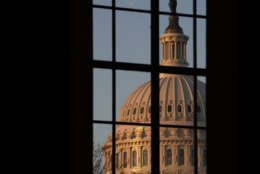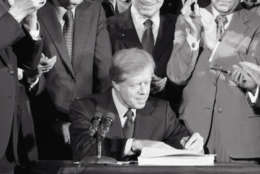Federal Report
-
Are you a TSP millionaire? If not, what steps can you take to maximize your retirement benefits? Find out this week when Tom O'Rourke, principal at Miles & Stockbridge joins host Mike Causey on Your Turn. September 5, 2018
September 05, 2018 -
Whether you get a pay raise or not next January, chances are you are worth more than you think — literally.
September 05, 2018 -
Many federal workers have heard that the current record-long bull market can’t last forever. Many of the experts say a 20 percent to even 30 percent drop in the stock market is possible.
September 04, 2018 -
In many parts of the country today marks the unofficial, but real end of summer. Schools that are not in session will be tomorrow, and traffic will be back to full gridlock mode.
September 03, 2018 -
The upside to the Russia pension system is that it is indexed to inflation. The downside is that the average life expectancy for Russian men is reportedly 59.
August 31, 2018 -
The leaders of federal and postal unions almost always endorse Democratic candidates for office, so is that a good thing for union members?
August 30, 2018 -
Federal News Radio reporters Nicole Ogrysko and Jory Heckman join host Mike Causey on this week's Your Turn to discuss the recent court ruling against the Trump administration’s crackdown against federal unions, and why there is a mini-exodus of scientists from the federal government. Aug. 29, 2018
August 29, 2018 -
The recent court ruling against the administration’s crackdown by executive order against federal unions delighted some people inside government. Others think the decision is highly political.
August 29, 2018 -
Many who have been comfortably stationed in Washington for decades are literally running for their political lives this year.
August 28, 2018 -
The C Fund of the Thrift Savings Plan tracks the U.S. stock market's 500 largest publicly traded funds. The S Fund tracks the remaining 4,500 so-called small caps, although many are far from small.
August 27, 2018 -
Many feds have been watching the progress of "retirement reform" bills each year and making plans to retire, if they could, before their effective date, if that was possible.
August 24, 2018 -
When many long-time feds hear that their office has visitors from the Government Accountability Office, their first instinct is to head for the hills. But long-time CMS worker Anthony Corridore says this can be a win-win situation.
August 23, 2018 -
This week on Your Turn, Federal News Radio reporter Nicole Ogrysko will discuss the past, present and future of the federal civil service, and Federal News Radio Senior Digital Editor Michael O'Connell will explain how podcasts could help you get ahead in your federal career. August 22, 2018
August 22, 2018 -
Forty years after the civil service was officially “reformed” by the Carter administration, a new team with very different ideas about the role of government and regulations is looking to do some reforming of its own.
August 22, 2018 -
Depending on which experts you ask, federal civil servants are either paid 30-plus percent more than the average private sector employee, or 30-plus percent less.
August 21, 2018














